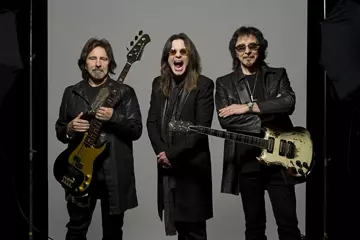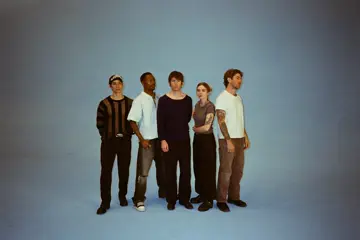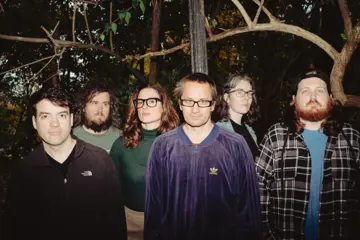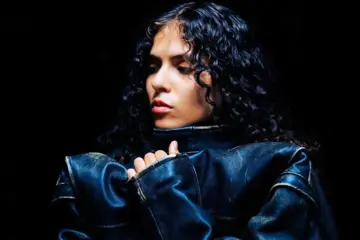If you ever saw that extraordinary television series, Tremé, based on life in the real 6th Ward neighbourhood in New Orleans post-Hurricane Katrina made by the guys behind The Wire, you'll have seen multi-instrumentalist Troy “Trombone Shorty” Andrews play himself in the occasional episode. It's perfect casting since Andrews grew up in the neighbourhood and is steeped in the whole Brass Band ethos that has made it famous courtesy bands like the Dirty Dozen Brass Band and the Preservation Hall Jazz Band, both of whom have visited Australia.
Not that Trombone Shorty is a traditionalist, but he certainly started out in that tradition, as a precocious four-year-old, also learning trumpet and drums by the time he began playing in his first band at just six. In a sense, then, though Andrews' music with his band Orleans Avenue is much more contemporary – supafunkrock as he himself describes it – it was important to include an element of that brass band history in their latest album, For True.
“Oh yeah,” Andrews explains, on the line from his home in New Orleans. “Playin' with Rebirth [Brass Band, who also feature in the TV series] and getting those guys, you know I grew up listenin' to them, I played a bunch of shows with them and I just wanted to invite them on some music that we were doin'. So basically what I was doin' on that track, Buckjump, along with 5th Ward Weebie, who is a legendary New Orleans sound trapper, which is a sub genre of hip hop in New Orleans that's been goin' on for about twenty-plus years and it's a big thing just as the brass band music is in New Orleans, that's important also. So I just wanted see what two different New Orleans strong points of music would sound like with the new sound that we're creatin', put all three styles on one track like a gumbo and see what happens.”
Like pretty much every other kind of popular contemporary American music, it all pretty much starts in and around New Orleans and the Mississippi Delta, a mix of blues, gospel and jazz – so even the supafunkrock of Trombone Shorty & Orleans Avenue comes from that same gumbo.
Don't miss a beat with our FREE daily newsletter
“I discovered the funk when I was a kid. I grew up around Cyril Neville and the Neville Brothers and my grandfather Jessie Hill, he was an r'n'b singer back in the day – he was workin' with Dr John and Allan Toussaint and all those guys – so I've been discovering the funk maybe before anything else. I mean, brass bands are considered to be funky in New Orleans. The Rebirth Brass Band and Dirty Dozen are the ones that changed the sound of New Orleans brass bands and we consider Rebirth to be a funk band, so I was always listenin' to their music and gettin' their stuff. I mean my mum was a big fan of James Brown, so the funk has always been around me.
“But I'm also a big fan of electric guitar – Nine Inch Nails and Lenny Kravitz, Prince and all those people – so [the supafunkrock] just happened – I don't when it happened, but it just happened. We've been en route to creatin' this sound for while and it just developed into that. I have no idea.”
There are a few other well-known names contributing to For True – the previous album, 2010's Backatown, their first for a major though actually their third, was exclusively just the band – among them the aforementioned early mentor, Lenny Kravitz, who “discovered” Andrews back in 2005 and took him on tour; Kid Rock, bluesman Warren Haynes and English guitar hero Jeff Beck.
“I've been knowing Lenny for about years now and we've been playin' together and collaboratin' for a while. He lives in New Orleans sometimes – he has a house here – and he happened to be in town and he invited me to dinner and I told him we were goin' to the studio and he just invited himself and all of his friends over to the studio to check out something. He wasn't even plannin' to play, but I was just lettin' him hear some music and he jumped on the bass and played and we collaborated and did some things.
“All the other musicians I'm big fans of. Jeff Beck I've been on tour with him over in the UK and I play with him in New Orleans on the jazz stuff and I just invited him on the record. And I got to meet Kid Rock and we shared the stage with him and Warren I played with at his annual benefit gig and I'm a big fan of everybody that's on the record, so I just invited them on the record to see if they'd like to contribute. Everyone was really cool and wanted to get on a CD with us and it just worked out easy like that.”
One of the highlights of making the new album was the chance to co-write a tune, Encore, with the legendary Lamont Dozier. He was part of a songwriting team with brothers Brian and Edward Holland that composed and produced – for Motown between 1962 and 1968, then freelance until around 1974 – for artists like Martha & The Vandellas, The Supremes, the Four Tops and Marvin Gaye among many.
“Oh my God it was a dream come true,” Andrews admits. “You know, he's a legendary writer and he's wrote so many number one hits, it was just an honour to be able to collaborate with one of the greatest writers and musicians of all time. A lady from Universal in the United States has been working with his grandson or someone liked that and we had a tune and she just reached out to him and he liked it and he wrote some things to it and he sent it back to us.”
As it happens, Dozier and a couple of members of Orleans Avenue helped cover the one aspect of his songwriting Andrews feels isn't his strong point.
“I was always writin' brass bands tunes – it was very easy to do that – and as time went by I was able to develop more writin' skills as I got into more different types of music, you know. So it's always been there – probably beginnin' of junior high school I was always tryin' to write some things and I just kept it goin'. I'm not good at writin' lyrics. I can write a good chorus or hook or whatever you wanna call it, but I haven't really developed writin' any good lyrics myself, that's why, on these records for a while, I'm just tryin' to get in the studio with great lyricists so I can pick up some things and learn from that.
“I used to listen to music but I'd never really listen to the words. I used to listen melodies as a kid and just listen to music overall and I couldn't really recite the words back to you if asked me to of any artist, because I was so much into the music and what notes they were choosin' to put over certain chord changes. So as I started to write more and sing it a bit more, I had to backtrack and learn to listen to words and stories. So it's somethin' that's in development and I just have to just keep surrounding myself with some of the greats and just pick up here and there and learn a few things.”
Like Andrews, his band, Orleans Avenue – Mike Ballard on bass, Pete Murano on guitar, Joey Peebles on drums and percussion, Dwayne Williams on percussion, Dan Oestreicher on baritone sax and Tim McFatter on tenor sax – all grew up in New Orleans.
“I've been playing with Mike and Joey in different situations since were kids. I met them at the Satchmo Jazz Summer Camp at New Orleans and we were all really, really young teenagers. And I met some of the rest of the band at the New Orleans Centre for Creative Arts – NOCCA – and we've all been playin' since a while and my saxophone section, I met them through my guitar player. He went to school with my baritone player – the baritone player and I actually played a few shows together with another band back in the day and a few years later he introduced me to my tenor saxophonist that we have now.
“I just wanted to put together the best group of young musicians that I thought were good in my class and create a band, 'cause I was already playin' around town with my brothers and I was startin' to get my own and I was hirin' different musicians every weekend to play, but I just decided when I got to NOCCA that that's the place where I needed to be and that I can develop with some younger musicians and start developin' our own sound instead of just playin' songs that everybody else plays.”















